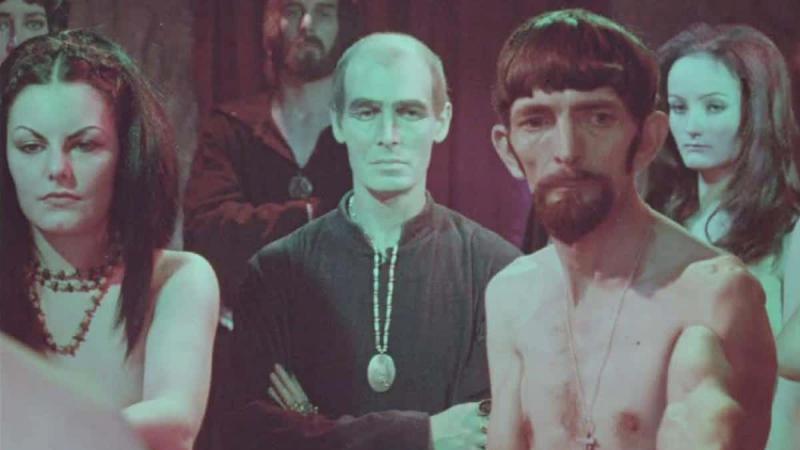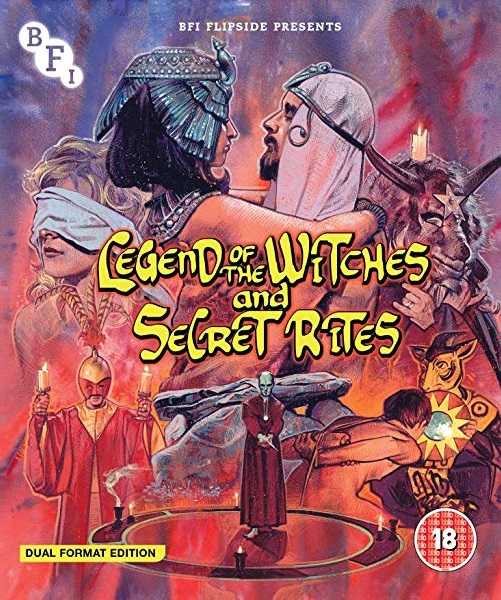DVD/Blu-ray: Legend of the Witches & Secret Rites | reviews, news & interviews
DVD/Blu-ray: Legend of the Witches & Secret Rites
DVD/Blu-ray: Legend of the Witches & Secret Rites
Modish early '70s documentaries about Wicca were aimed at the dirty mac brigade

The British Film Institute’s excellent Flipside strand resurrects neglected or marginalised UK movies, many of them reflecting the social flux of the 1960s and 1970s.
Legend of the Witches is a partially dramatised documentary that uses arty black-and-white cinematography as it recounts a history of witchcraft, beginning with the druidic worship of the sun and the moon and stressing how Christianity adopted pagan temples and rites. Members of the Wicca high priest Alex Sanders’s coven enact a rural initiation – which starts with a beautiful naked girl coaxing a blindfolded naked man through a rugged terrain – and a black mass. The best sequence is an eerie visit to the Museum of Witchcraft (still open) in Boscastle, Cornwall.
 Secret Rites is a faux docudrama that presents Wicca as an alternative lifestyle choice. It sends a pretty young hairdresser (played, as herself, by actress-model Penny Beeching, who appeared in Up Pompeii! and The Morecambe & Wise Show) on a tube train to seek initiation, along with one “Bryan", in Sanders’s Notting Hill coven. The founder of Alexandrian Wicca, which emphasises ceremonial magic and incorporates qabalist elements, Sanders (1926-1988) was the pre-eminent British occultist of the time and a publicity seeker. Resembling a bald Peter O’Toole, he lies on top of the naked Penny to complete her initiation and looks directly at the camera as he solemnly explains different rites.
Secret Rites is a faux docudrama that presents Wicca as an alternative lifestyle choice. It sends a pretty young hairdresser (played, as herself, by actress-model Penny Beeching, who appeared in Up Pompeii! and The Morecambe & Wise Show) on a tube train to seek initiation, along with one “Bryan", in Sanders’s Notting Hill coven. The founder of Alexandrian Wicca, which emphasises ceremonial magic and incorporates qabalist elements, Sanders (1926-1988) was the pre-eminent British occultist of the time and a publicity seeker. Resembling a bald Peter O’Toole, he lies on top of the naked Penny to complete her initiation and looks directly at the camera as he solemnly explains different rites.
Mostly shot in a studio, its single set’s walls luridly bathed in lilac and deep pink, the movie suggests a knockdown version of one of Roger Corman’s Edgar Allan Poe adaptations or a Hammer horror entry. The identity of The Spindle, the mystery band which provides the churning Hammond organ-heavy soundtrack, is the subject of an investigative essay by the music critic Rob Young in the disc’s illustrated booklet.
The stern narrator of Legend of the Witches and his excited counterpart on Secret Rites, both men, scarcely allay the fact that these films partake of the same sexual exploitation inherent in some occult practices, which Sanders is at pains to defuse in Secret Rites’s prologue. For long stretches, both films ogle the naked bodies of attractive young female coven members (pictured below) – their male equivalents were apparently chosen for their beards rather than their physiques. Flipside founders and curators William Fowler and Vic Pratt speculate on their Secret Rites audio commentary that Ford, who had turned to exploitation cinema after working in television, cast porn actors alongside initiated witches in the film.
The supplemental shorts are no less valuable cultural artefacts than the main features. They include journalist Dan Farson’s all-too-brief 1957 TV interviews with Gerald Gardner (1884-1964), the founder of Wicca, and the witch-cult theorist and anthropologist Margaret Murray (1863-1963). The Witch’s Fiddle (1924) is an eldritch silent in which a conically-hatted crone gives a magical violin to a strolling musician who had assisted her. The Judgement of Albion (1986), a portentous call to anti-capitalism that uses Blakeian imagery, was directed by Robert Wynne-Simmons (screenwriter of the folk horror classic The Blood on Satan’s Claw). Getting It Straight in Notting Hill Gate (1970), which documents counter-cultural activity and social inequality in Notting Hill, includes an interview with Caroline Coon, the artist and founder of the legal aid agency Release, and a rehearsal by local psychedelic-prog band Quintessence.
The future of Arts Journalism
You can stop theartsdesk.com closing!
We urgently need financing to survive. Our fundraising drive has thus far raised £49,000 but we need to reach £100,000 or we will be forced to close. Please contribute here: https://gofund.me/c3f6033d
And if you can forward this information to anyone who might assist, we’d be grateful.

Subscribe to theartsdesk.com
Thank you for continuing to read our work on theartsdesk.com. For unlimited access to every article in its entirety, including our archive of more than 15,000 pieces, we're asking for £5 per month or £40 per year. We feel it's a very good deal, and hope you do too.
To take a subscription now simply click here.
And if you're looking for that extra gift for a friend or family member, why not treat them to a theartsdesk.com gift subscription?
more Film
 London Film Festival - from paranoia in Brazil and Iran, to light relief in New York and Tuscany
'Jay Kelly' disappoints, 'It Was Just an Accident' doesn't
London Film Festival - from paranoia in Brazil and Iran, to light relief in New York and Tuscany
'Jay Kelly' disappoints, 'It Was Just an Accident' doesn't
 Iron Ladies review - working-class heroines of the Miners' Strike
Documentary salutes the staunch women who fought Thatcher's pit closures
Iron Ladies review - working-class heroines of the Miners' Strike
Documentary salutes the staunch women who fought Thatcher's pit closures
 Blu-ray: The Man in the White Suit
Ealing Studios' prescient black comedy, as sharp as ever
Blu-ray: The Man in the White Suit
Ealing Studios' prescient black comedy, as sharp as ever
 The Woman in Cabin 10 review - Scandi noir meets Agatha Christie on a superyacht
Reason goes overboard on a seagoing mystery thriller
The Woman in Cabin 10 review - Scandi noir meets Agatha Christie on a superyacht
Reason goes overboard on a seagoing mystery thriller
 London Film Festival 2025 - crime, punishment, pop stars and shrinks
Daniel Craig investigates, Jodie Foster speaks French and Colin Farrell has a gambling habit
London Film Festival 2025 - crime, punishment, pop stars and shrinks
Daniel Craig investigates, Jodie Foster speaks French and Colin Farrell has a gambling habit
 I Swear review - taking stock of Tourette's
A sharp and moving tale of cuss-words and tics
I Swear review - taking stock of Tourette's
A sharp and moving tale of cuss-words and tics
 A House of Dynamite review - the final countdown
Kathryn Bigelow's cautionary tale sets the nuclear clock ticking again
A House of Dynamite review - the final countdown
Kathryn Bigelow's cautionary tale sets the nuclear clock ticking again
 theartsdesk Q&A: Idris Elba on playing a US President faced with a missile crisis in 'A House of Dynamite'
The star talks about Presidential decision-making when millions of lives are imperilled
theartsdesk Q&A: Idris Elba on playing a US President faced with a missile crisis in 'A House of Dynamite'
The star talks about Presidential decision-making when millions of lives are imperilled
 Urchin review - superb homeless drama
Frank Dillane gives a star-making turn in Harris Dickinson’s impressive directorial debut
Urchin review - superb homeless drama
Frank Dillane gives a star-making turn in Harris Dickinson’s impressive directorial debut
 Mr Blake at Your Service review - John Malkovich in unlikely role as an English butler
Weird comedy directed by novelist Gilles Legardinier
Mr Blake at Your Service review - John Malkovich in unlikely role as an English butler
Weird comedy directed by novelist Gilles Legardinier
 Don't Let's Go to the Dogs Tonight review - vivid adaptation of a memoir about a Rhodesian childhood
Embeth Davidtz delivers an impressive directing debut and an exceptional child star
Don't Let's Go to the Dogs Tonight review - vivid adaptation of a memoir about a Rhodesian childhood
Embeth Davidtz delivers an impressive directing debut and an exceptional child star

Add comment